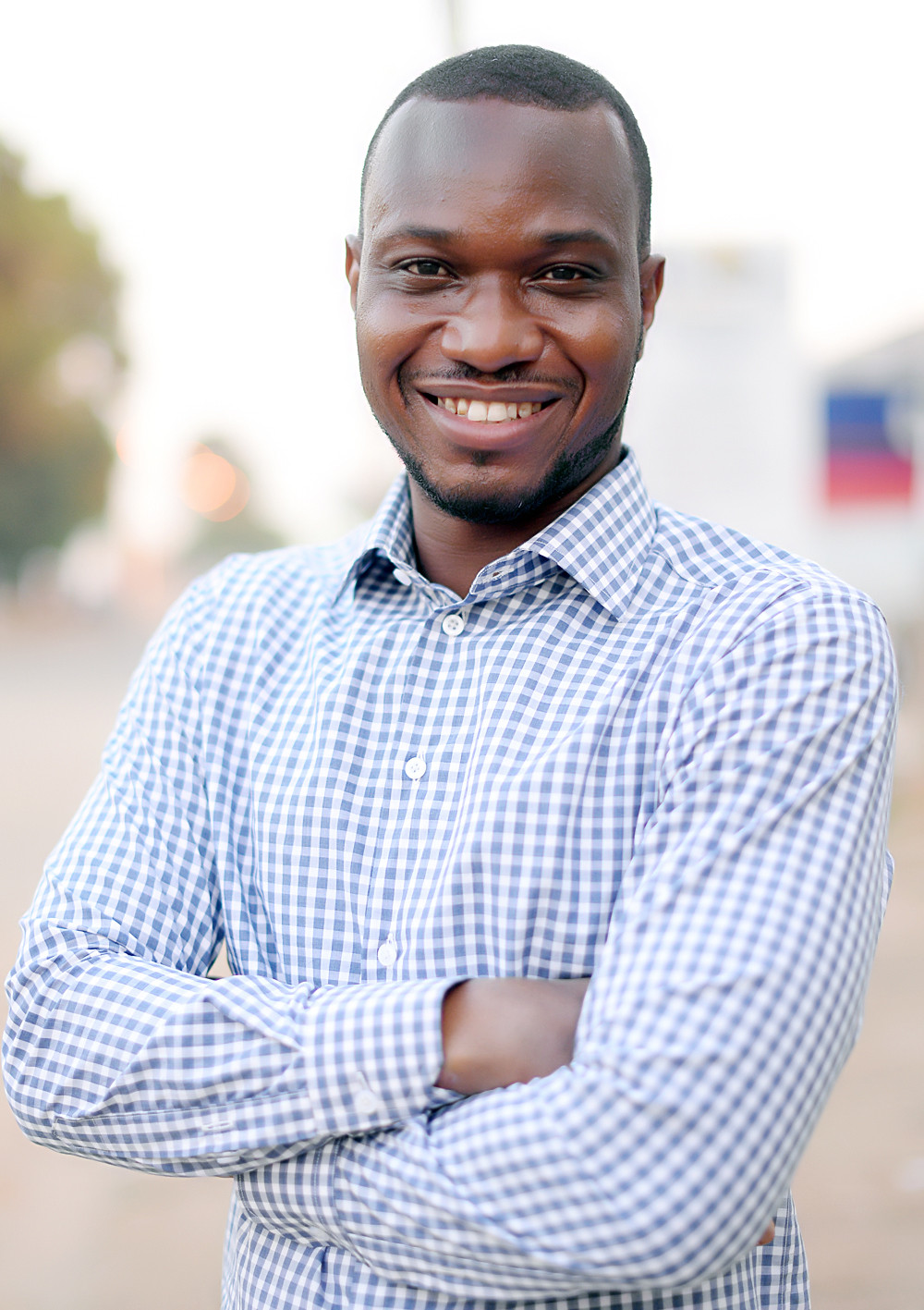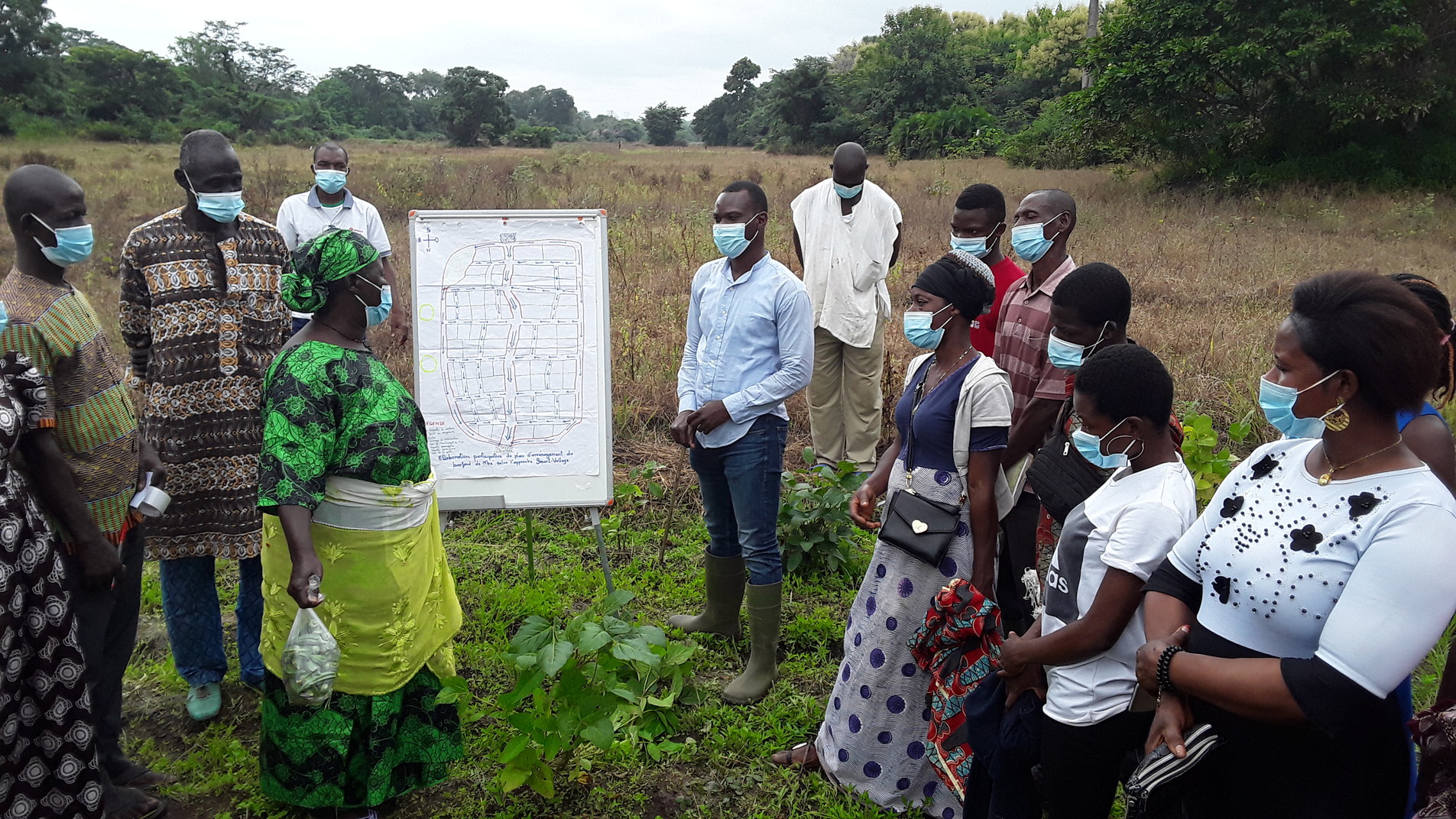
Dr. Dossou-Yovo

Dr. Dossou-Yovo working in the field
Media Resources:
Announcement Ceremony Video
Press Release
Dr. Elliott Dossou-Yovo
BENIN
Dr. Elliott Dossou-Yovo, Agriculture and Climate Change Specialist at Africa Rice Center, has been named the 2021 recipient of the Norman E. Borlaug Award for Field Research and Application, Endowed by The Rockefeller Foundation. He is recognized for spearheading innovative water management systems for resilient rice production in the face of climate change. His groundbreaking research and close collaboration with smallholder farmers has empowered thousands of rice farmers throughout West Africa to use climate-smart cultivation techniques to earn greater incomes, achieve food and nutrition security, and enhance agroecosystems.
Dossou-Yovo joined AfricaRice in 2016 as an International Consultant in Data Analysis and Project Management, and currently conducts research as Associate Principal Scientist and Climate Change Specialist. He pursued a BSc and an MSc in Natural Resources Management at the University of Abomey-Calavi, Benin. Dossou-Yovo received his PhD in Soil Science from the University of Cape Coast, Ghana.
When Dossou-Yovo joined AfricaRice, the first order of business was to restore the research laboratories and fields that had been abandoned for eleven years due to civil unrest in Côte d’Ivoire. In challenging conditions, with limited human and financial resources, he was persistent in rehabilitating the lab and experimental fields and remained focused on finding ways to improve African livelihoods. His tenacity produced impressive achievements contributing to better food and nutrition security, and he was soon promoted to lead AfricaRice’s climate-related research activities.
In West Africa, inland valleys are important agroecosystems for rice cultivation, but poor water control is a major challenge for agricultural development. In Burkina Faso, Dossou-Yovo pioneered a low-cost and participatory approach for land and water development called ‘Smart-Valleys’, adapting it to the local semi-arid conditions. Through this novel approach, fertilizer use efficiency increased and the impact of drought on rice plants was reduced. Rice yields more than doubled.
Rice farming organizations in Burkina Faso witnessed these benefits and requested support for implementing the Smart-Valleys approach. Dossou-Yovo developed training guides and conducted capacity-building activities to enable farmers, extension agents and technicians to adopt Smart-Valleys. Due to his extraordinary efforts, Smart-Valleys is now included in Benin’s National Strategy for Irrigation and is proposed for inclusion in the National Rice Development Strategy of Burkina Faso.
Temperature changes, rainfall variability and other impacts of climate change have led more rice farmers to use irrigation to overcome these challenges; however, water scarcity is a major limiting factor. In Côte d’Ivoire and Burkina Faso, Dossou-Yovo led the adaptation of the alternate wetting and drying irrigation method (AWD) to address this problem. AWD methods reduced the use of irrigation water by more than a third and diminished weed infestations by half, while maintaining the same rice yield as farmers who were continuously flooding the field. The result was more water available in the dams, which allowed more farmers to use irrigation to produce rice in the dry season.
Using digital tools such as modeling and Geographical Information Systems, as well as household surveys, Dossou-Yovo conducted analytic studies to develop demand-driven technologies not only at the farm level, but at community and regional levels. He closely communicated with stakeholders such as farmers, extension officers, and partners in National Agricultural Research Systems (NARS) to adapt, evaluate and scale agricultural technologies.
Dossou-Yovo is passionate about working with farmers and extension agents to co-design solutions to address their needs. He developed training manuals and e-learning tools, provided on-the-job training, and organized field days and workshops for hands-on capacity-building of thousands of smallholder farmers and other stakeholders with Smart-Valleys, AWD and many other important innovations. He then used the outcomes of these activities to further improve the systems and techniques to best meet the needs of farmers.
He used this participatory approach with farmers to co-design, implement and evaluate ways of integrating rice fields with legume, vegetable, and fish production that significantly increased food and nutrition security. Farmers adopting these diversified rice farming systems in Côte d’Ivoire and Ghana saw their income more than double. At the same time, they reduced the use of chemical inputs and preserved biodiversity and ecosystem services.
Dossou-Yovo now leads several project collaborations with prominent CGIAR centers, the World Bank, universities, development agencies such as Rikolto, private industry and other organizations in Benin, Burkina Faso, Côte d’Ivoire, Mali, Nigeria, Senegal, Togo and Tanzania. He focuses on expected future problems and a systems approach to prepare policy-makers to incorporate climate-smart rice technologies into national rice development programs.
The water control approaches that Dossou-Yovo adapted, developed and disseminated, including “Smart-Valleys” and “alternative wetting and drying irrigation”, among others, have reduced the impact of drought and the use of chemical inputs, while increasing yields and incomes for rice farmers. By generating low-cost, effective, socially accepted and environmentally friendly water management strategies, he directly contributes to poverty alleviation and food security, particularly for women and young people.
Pushing through adversity in his research pursuits, Dr. Dossou-Yovo advances his primary mission of achieving measurable and meaningful impact in farming communities, exhibiting the qualities manifested by Dr. Norman E. Borlaug in his endeavor to end poverty and hunger.


